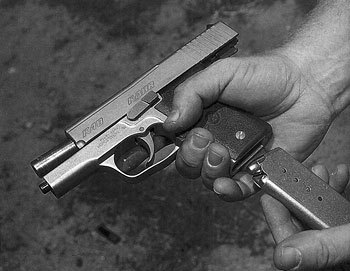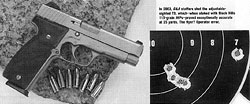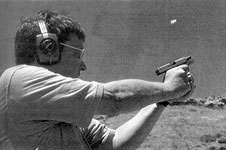- Telephone: 508-795-3919
- Contact Us
- My Account • Dealer Log In
- Technical Support • Service Shipping

Big Little Gun or Little Big Gun?
Working within a basic template, Kahr has managed to keep its pistol line efficient, effective—and interesting.
Guns & Ammo Annual 2007, p. 68 - 71
By Payton Miller

Since its inception in 1993, Kahr Arms has established an enviable reputation as a maker of accurate, reliable and extremely well-made striker-fired double-action-only autos. The niche they occupy, obviously, is that of self-defense. Kahr hasn’t wasted time in chambering its guns in anything less than serious calibers—9mm, .40 S&W and .45 ACP.
Kahr designer Justin Moon’s original concept has proven flexible enough to accept all three of our preeminent auto-pistol cartridges. And it’s proven capable of dimensional modifications within its design parameters.
The landmark model, the one that put the Kahr name on the map, was the K9 Compact followed a few years later. Both of these guns made an immediate critical impact among handgunners interested in concealed carry pistols.
It’s pretty easy to see why. Both the K9 and K40 were all-steel in construction and—despite their diminutive dimensions—built like bank vaults. Arguably small guns, they nevertheless had what could best be described as a “big gun” feel. Both had sighting planes seemingly as broad as a six-lane highway; the sights themselves were very easy to acquire quickly. In addition, both guns—thanks to an exceptionally short, smooth double-action-only trigger—were capable of a higher degree of inherent accuracy than normal for a concealed carry pistol.

A three-inch-barreled Kahr 9mm Micro (top) is about the same size as the S&W .22 AirLite snubbie—and is considerably more powerful.

In 2003, G&A staffers shot the adjustable-sighted T9, which—when stoked with Black Hills 115-grain JHPs—proved exceptionally accurate at 25 yards. The flyer? Operator error.

Even in ,40 S&W, Kahr pistols—like this K40 Convert—are more controllable than their dimensions would lead you to believe.
In the last 16 years or so, Kahr has offered several variants in terms of size, finish, sights and so forth without seriously disturbing the basic template: a short-recoil, single-stack double-action-only with a blessed shortage of controls—namely a slide stop and a Browning-type pushbutton magazine release. And, thankfully, no magazine disconnect.
I remember my first range session with a Kahr, a K40 Convert in 1998. The Convert was a .40 S&W version of the company’s Mark 9 Micro Compact, which was, in turn, a chopped version of the original K9. I remember what my shooting partner—a dyed-in-the-wool wheelgun fanatic—said.
“I like this. It’s as close to a revolver as you can get. Point it, pull the trigger.”
That comment pretty much mirrored my feelings about the gun, which were considerably enhanced by its smooth, seven-pound double-action-only trigger and the fact that its all-steel 26-ounce weight made even the heftier 180-grain loads relatively easy to control.
By the late 1990s, polymer-framed pistols were making serious inroads in the handgun market (thank to the near-universal acceptance of the Glock). In 1999, Kahr introduced the P9, almost identical to the K9 except that it had a polymer frame. In 2003, the company came up with the PM9, a compact, three-inch-barreled version of the P9.
To many shooters with an interest in concealed carry, the introduction of the PM9 was a significant event in that the pistol combined a lightweight .380-size platform with 9mm Parabellum power.
About the same time, Kahr introduced the T-series, a sort of deluxe “full size” take on the compact (and micro-compact) guns. This group featured a four-inch polygonal rifled barrel, Hogue Pau Ferro wood grips and a smoothed-up trigger action. The first 9mm model was of matte stainless steel construction. The second was the TP9, which was basically the same gun except with a black polymer frame. Then, in 2004, the company offered a .40 S&W version of all-stainless steel construction. More recently, Kahr has come up with the TP40, a polymer-framed .40 S&W number.
I shot the TP9, which proved to be exceptionally accurate and extremely pleasant to shoot. With a 32-ounce weight and adjustable sights, it was a paper-puncher’s delight—especially impressive when you stop to consider that it is a double-action-only.
In the current mania for micro-compact pistols, it’s easy to lose sight of the inevitable tradeoff between diminutive dimensions and shootability. But Kahr has never sacrificed shootability on the alter of reduced dimensions. Sure, the four-inch-barreled T9 steel-framed 9mm is a lot more fun to shoot than a three- or 3 1/2-inch-barreled .40; the little Kahr .40s do require practice to control.
Kahr pistols can be had in a fairly easy-to-figure-out array to configurations.
Besides the three calibers, barrel lengths include three, 3 1/2 and four inches. One of the latest—and most impressive—variations on the Kahr themes is the P40 Convert, a potent .40 S&W short-grip polymer-framed pistol with a 17-ounce curb weight and a three-inch barrel. This one has got to represent the peak (or very close to it) of the weight-to-power ratio.
There’s even an E9, an economy-priced polymer-framed 9mm with a matte stainless finish.
Current finishes include matte stainless, blackened stainless and polished stainless. Current sight configurations include tritium nights sights or Novak low-profile tritium night sights.
Working within the template of the basic Kahr pistol, the company has more than enough variants to satisfy the pickiest shooter without radically short-changing the original ergonomic integrity of the design. Whatever Kahr comes up with in the future is sure to be worth a look.
<< Go back to Previous Page
